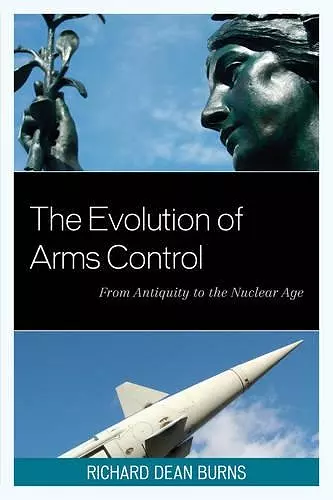The Evolution of Arms Control
From Antiquity to the Nuclear Age
Format:Paperback
Publisher:Rowman & Littlefield
Published:6th Jun '13
Currently unavailable, and unfortunately no date known when it will be back

Drawing on his knowledge of the comparative history of warfare and arms control across preliterate, ancient, medieval, and modern polities, Richard Dean Burns focuses longitudinally on such perennial arms control issues as negotiation, verification, and compliance. Although he does not, for example, allege that war elephants and nuclear weapons are of equal destructive potential, he does discern instructive similarities between Carthage in 202 BCE and Iraq in 1991 AD. Arms control and disarmament measures have been pursued and adopted throughout the history and prehistory of human warfare: sometimes as protocols recognizing evolving humanitarian taboos; sometimes as terms imposed by the victors on the vanquished; and sometimes as accords negotiated between rivals fearful of mutual destruction. Arms control measures ramped up in significance and urgency at the dawn of the 20th century by the introduction of rapid-fire weapons, aircraft, chemical agents, and submarines, and again at mid-century with the advent of weapons of mass destruction—nuclear, chemical, and bacteriological—with sophisticated delivery systems. As Burns makes clear, the enormous increase in destructive potential brought about by thermonuclear weaponry essentially changed the nature of war and, therefore, of arms control.
This is a concise, comprehensive, and scholarly work. Burns (emer., history, California State Univ., Los Angeles) traces arms control efforts back to the Punic Wars, and in some cases beyond. The most common types of efforts have been imposed on the vanquished by the victors. However, the Treaty of Versailles established a multilateral body to enforce its terms, the League of Nations, but it was easily subverted. The problems with arms control agreements are trying to distinguish between offensive and defensive weaponry, state sovereignty, technological change, and verification. One of the more interesting parts of the book deals with chemical weapons. Again, the origins go back to antiquity in attempts to control or outlaw such weapons as Greek fire, the poisoning of wells, and other chemical and biological agents. There have been many diplomatic attempts, all of which the author includes, to outlaw such weapons. But, they are still available and used. More successful have been attempts to control nuclear weapons, perhaps because these attempts have largely been bilateral. This is an excellent reference book and should be acquired by academic libraries. Summing Up: Recommended. Upper-division undergraduate and graduate collections. * CHOICE *
Burns chronicles the progression of arms negotiations, allowing readers to visualize the intricacy of arms control and grasp the difficulties of finding common ground in preventing the spread of nuclear weapons. Whether the world's diplomatic efforts will be successful remains to be seen. Still, a major contribution. … Highly recommended. * CHOICE *
Written for anyone interested in arms control and disarmament issues as well as military history, this book reviews the historic means and techniques for arms control such as demilitarization, regulation of arms manufacturing, stabilizing international environments and the outlawing of war. A section also reviews nuclear weaponry before and after the Cold War and the emergence of biological and bacterial delivery systems. * Reference and Research Book News *
Richard Dean Burns’s The Evolution of Arms Control is at once a timely and significant contribution to the literature of the subject, written in plain English by one of America’s leading historian of arms control and disarmament. This thoughtful book will provide both generalists and specialists a better understanding of the multidimensionality of the most important issue of our age. All politicians and their advisers should give this work a careful read as they consider how their policies will enhance or inhibit the development of a more stable, secure world. -- Joseph M. Siracusa, Deputy Dean of Global Studies, The Royal Melbourne Institute of Technology University
With President Obama and former Secretaries of State George Schultz and Henry Kissinger calling for ‘A World Without Nuclear Weapons,’ arms control is in the news more than in decades. What will happen? With its well-documented facts and chronologies, Richard Dean Burns’s highly readable history of arms control will help the reader navigate the difficult waters of international diplomacy and gain new insight into where the Obama administration may succeed. -- Hon. Philip E. Coyle III, Senior Advisor, World Security Institute; Former Assistant Secretary of Defense
ISBN: 9781442223790
Dimensions: 227mm x 151mm x 21mm
Weight: 390g
264 pages